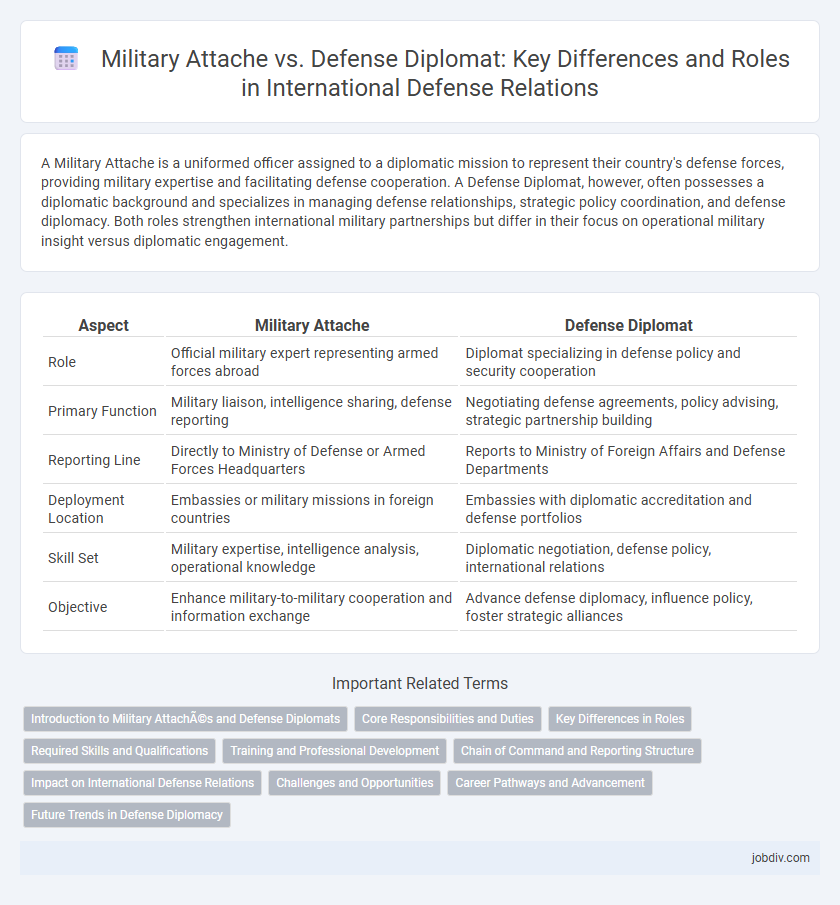A Military Attache is a uniformed officer assigned to a diplomatic mission to represent their country's defense forces, providing military expertise and facilitating defense cooperation. A Defense Diplomat, however, often possesses a diplomatic background and specializes in managing defense relationships, strategic policy coordination, and defense diplomacy. Both roles strengthen international military partnerships but differ in their focus on operational military insight versus diplomatic engagement.
Table of Comparison
| Aspect | Military Attache | Defense Diplomat |
|---|---|---|
| Role | Official military expert representing armed forces abroad | Diplomat specializing in defense policy and security cooperation |
| Primary Function | Military liaison, intelligence sharing, defense reporting | Negotiating defense agreements, policy advising, strategic partnership building |
| Reporting Line | Directly to Ministry of Defense or Armed Forces Headquarters | Reports to Ministry of Foreign Affairs and Defense Departments |
| Deployment Location | Embassies or military missions in foreign countries | Embassies with diplomatic accreditation and defense portfolios |
| Skill Set | Military expertise, intelligence analysis, operational knowledge | Diplomatic negotiation, defense policy, international relations |
| Objective | Enhance military-to-military cooperation and information exchange | Advance defense diplomacy, influence policy, foster strategic alliances |
Introduction to Military Attachés and Defense Diplomats
Military attaches serve as official representatives of their nation's armed forces within foreign embassies, providing expertise on defense matters, military cooperation, and intelligence gathering. Defense diplomats engage in strategic dialogue, policy negotiation, and fostering bilateral or multilateral defense relationships to advance national security objectives. Both roles bridge military and diplomatic spheres, ensuring coordination between defense establishments and host countries.
Core Responsibilities and Duties
Military Attaches primarily serve as official military representatives of their home country within a foreign embassy, focusing on intelligence gathering, military liaison, and facilitating defense cooperation. Defense Diplomats engage in broader diplomatic efforts, managing defense policy negotiations, security partnerships, and multilateral defense initiatives to strengthen international defense relations. Both roles require deep knowledge of military strategy and international security but differ in scope, with Attaches emphasizing tactical military communication and Diplomats prioritizing strategic defense diplomacy.
Key Differences in Roles
Military Attaches serve as official representatives of their country's armed forces within foreign embassies, primarily tasked with gathering military intelligence, facilitating defense cooperation, and reporting on host nation military developments. Defense Diplomats operate within a broader diplomatic framework, engaging in strategic policy dialogue, negotiating defense agreements, and promoting military partnerships at the governmental level. The key difference lies in Military Attaches' emphasis on tactical and operational intelligence support, whereas Defense Diplomats concentrate on high-level defense policy coordination and international security collaborations.
Required Skills and Qualifications
Military Attaches require extensive military experience, strong knowledge of defense protocols, and expertise in intelligence gathering and reporting. Defense Diplomats must possess advanced negotiation skills, deep understanding of international security policies, and proficiency in diplomatic communication. Both roles demand cultural sensitivity, strategic thinking, and the ability to operate effectively within complex geopolitical environments.
Training and Professional Development
Military Attaches undergo rigorous training focused on intelligence gathering, military liaison, and protocol within host nations, often receiving education at specialized defense colleges. Defense Diplomats, while sharing a foundational military background, pursue advanced professional development in international relations, defense policy, and diplomatic negotiation through institutions like the Royal College of Defence Studies. Continuous joint training programs enhance their strategic communication skills and adaptability in complex, multinational defense environments.
Chain of Command and Reporting Structure
A Military Attache operates under the direct supervision of the embassy's Chief of Mission and reports primarily to their home country's Ministry of Defense, ensuring alignment with military-specific directives. In contrast, a Defense Diplomat functions within the diplomatic corps, reporting to the embassy's Ambassador and coordinating defense policy through the Ministry of Foreign Affairs, thus integrating defense strategy with broader diplomatic objectives. Both roles maintain distinct chain of command structures that reflect their unique blend of military expertise and diplomatic engagement.
Impact on International Defense Relations
Military Attaches serve as official military representatives within embassies, facilitating direct communication and coordination between their home country's armed forces and the host nation. Defense Diplomats engage in broader strategic discussions, policy development, and defense cooperation initiatives that extend beyond military-to-military interactions. Their combined efforts enhance transparency, build trust, and strengthen bilateral and multilateral defense partnerships, significantly impacting international security frameworks.
Challenges and Opportunities
Military attaches face challenges in balancing operational secrecy with diplomatic transparency while navigating host country military protocols and intelligence gathering. Defense diplomats encounter opportunities to influence bilateral security cooperation and promote strategic partnerships through high-level policy dialogues and defense agreements. Both roles require adept cultural intelligence and adaptive communication skills to effectively advance national defense interests amid evolving geopolitical landscapes.
Career Pathways and Advancement
Military Attaches typically follow a career trajectory within armed forces, advancing through ranks with specialized training in international military relations and intelligence liaison roles. Defense Diplomats often emerge from diplomatic corps or defense policy sectors, emphasizing negotiation skills, defense cooperation, and strategic alliances at international forums. Career advancement for Military Attaches hinges on operational expertise and inter-military coordination, whereas Defense Diplomats gain promotion through policy development, international negotiation success, and defense diplomacy achievements.
Future Trends in Defense Diplomacy
Military attaches, traditionally tasked with intelligence gathering and liaison roles, are increasingly integrating advanced technology and cyber expertise to address emerging security challenges. Defense diplomats are expanding their scope beyond state-to-state relations, leveraging multilateral platforms and private sector partnerships to shape defense policies and regional stability. Future trends in defense diplomacy emphasize interoperability, hybrid warfare preparedness, and collaborative threat intelligence to enhance global security frameworks.
Military Attaché vs Defense Diplomat Infographic

 jobdiv.com
jobdiv.com